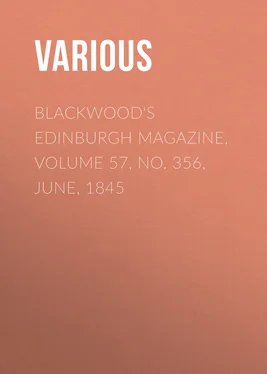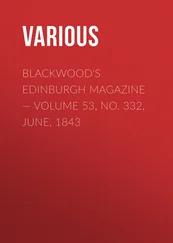Various - Blackwood's Edinburgh Magazine, Volume 57, No. 356, June, 1845
Здесь есть возможность читать онлайн «Various - Blackwood's Edinburgh Magazine, Volume 57, No. 356, June, 1845» — ознакомительный отрывок электронной книги совершенно бесплатно, а после прочтения отрывка купить полную версию. В некоторых случаях можно слушать аудио, скачать через торрент в формате fb2 и присутствует краткое содержание. Издательство: Иностранный паблик, Жанр: foreign_antique, periodic, foreign_edu, на английском языке. Описание произведения, (предисловие) а так же отзывы посетителей доступны на портале библиотеки ЛибКат.
- Название:Blackwood's Edinburgh Magazine, Volume 57, No. 356, June, 1845
- Автор:
- Издательство:Иностранный паблик
- Жанр:
- Год:неизвестен
- ISBN:нет данных
- Рейтинг книги:5 / 5. Голосов: 1
-
Избранное:Добавить в избранное
- Отзывы:
-
Ваша оценка:
- 100
- 1
- 2
- 3
- 4
- 5
Blackwood's Edinburgh Magazine, Volume 57, No. 356, June, 1845: краткое содержание, описание и аннотация
Предлагаем к чтению аннотацию, описание, краткое содержание или предисловие (зависит от того, что написал сам автор книги «Blackwood's Edinburgh Magazine, Volume 57, No. 356, June, 1845»). Если вы не нашли необходимую информацию о книге — напишите в комментариях, мы постараемся отыскать её.
Blackwood's Edinburgh Magazine, Volume 57, No. 356, June, 1845 — читать онлайн ознакомительный отрывок
Ниже представлен текст книги, разбитый по страницам. Система сохранения места последней прочитанной страницы, позволяет с удобством читать онлайн бесплатно книгу «Blackwood's Edinburgh Magazine, Volume 57, No. 356, June, 1845», без необходимости каждый раз заново искать на чём Вы остановились. Поставьте закладку, и сможете в любой момент перейти на страницу, на которой закончили чтение.
Интервал:
Закладка:
But the grief caused by this great and irreparable loss—a grief which threw its dark cold shadow over the whole of Púshkin's subsequent existence—was not unrelieved by feelings of a brighter tone: the void caused by friendship was filled up with love. In February of this year he was married, at Moscow, to the lady to whom (as we have mentioned above) he had been some time engaged. Mlle. Gontcháreff was of an ancient Russian family, and a person of singular beauty. "I am married," (writes the poet to one of his friends, in a letter dated February 24.) "I have now but one desire in the world, and that is, that nothing in my present life be changed. This existence is so new to me, that I feel as if I had been born again. The death of Délvig is the only shadow in my bright existence." Púshkin was desirous of editing a volume of the "Northern Flowers," in the following year, for the benefit of the family of his departed friend, for which he now began assiduously to collect materials. This labour detained him until the month of May in Moscow; and, before his migration to St Petersburg, the tragedy of Bóris Godunóff was printed. Among all the works of Púshkin there is not one which exhibits so high a degree of artistic skill, or so vigorous and powerful a genius, as this drama, in which every word, every dialogue, seems to unite the certainty of study and meditation with the fire and naturalness of a happy improvisation, and in which there is not a character nor an allusion which destroys the truth and vigour of the composition, viewed as a faithful mirror of Russian nationality, Russian history, and Russian character. The remainder of Púshkin's short, alas! but laborious life, however filled with the silent activity of intellectual occupation, offers but few materials for the biographer: it was passed principally at St Petersburg, varied by occasional journeys to Moscow, and the usual autumnal retirements, which we have mentioned as having been so favourable for the execution of the poet's literary tasks. We shall content ourselves with giving a slight account of the principal works in which Púshkin employed his great powers—powers which had now reached their highest point of vigour, retaining all the freshness and vivacity of youth, while they had acquired the maturity and solidity of manhood. The subjects of these works, however, being for the most part historical, are of a nature which renders them less susceptible of analysis in our pages—and indeed their local nature would cause such analysis to be devoid, in a great measure, of interest to the English reader. There is, however, one episode in the poet's life, which must possess peculiar interest to those who delight to watch that fond fidelity with which genius returns to the scenes where it was first developed, and which brought back Shakspeare, loaded with glory, to pass the calm evening of his life amid the native shades of Stratford. On quitting Moscow for St Petersburg, Púshkin passed a winter at Tsárskoë Seló. "This was a most blessed thought," he says, in a letter of 26th March; "I can thus pass my summer and autumn in a most enchanting and inspiring seclusion; close to the capital, in the circle of my dearest recollections. I shall be able to see you every week, and Jukóvskii also. Petersburg is within an hour's drive. Living is cheap here. I shall not want an equipage. What can be better?" And, in fact, it is certain that he never was so perfectly happy in his society and his occupations, and in himself, as in these summer and autumn months which he passed, as he says:—
"In those bright days when yet all ignorant of fame,
And knowing neither care, system, nor art, nor aim,
Thy tutelary shades, O Tsárskoë! were flinging
Gay echoes to his voice, the praise of Idlesse singing."
The beautiful retirement of Tsárskoë Seló was at this period dignified by the presence of two great poets, each producing works worthy of the imperial groves under whose shade they were meditated. Púshkin and Jukóvskii were not only residing here together, but they were engaged in a friendly rivalry, and each writing so industriously as though determined never to meet without some new poetic novelty. The deep impression produced by Jukóvskii's patriotic stanzas, written at this period, entitled "Russian Glory," was worthily responded to by the noble poems written by Púshkin, "To the Slanderers of Russia!" and "The Anniversary of Borodino,"—all these works being spirited and majestic embodiments of national triumph and exultation.
It is curious and delightful to remark, too, that the poets of Tsárskoë Seló were occupied, at this period, with the composition of two similar works of another and no less national character. These were "tales" or legends in the popular taste of the Russian people, that of Jukóvskii was entitled "The Lay of the Tsar Berendéi," and Púshkin's, "The Lay of the Tsar Saltán."
In this year, too, was printed Púshkin's small collection of prose tales, under the assumed name of Ivan Biélkin, which appeared with a biographical preface, describing the life and character of the supposed author. The tales are of extraordinary merit, remarkable for the simplicity and natural grace of the style, and the preface is a specimen of consummate excellence in point of quiet Addisonian humour.
In the year 1831, Púshkin girded up his loins to enter upon the great historical task; which had so long attracted his imagination, and which, difficult and arduous as was the undertaking, he was probably better calculated than any literary man whom Russia has yet seen, to execute in a manner worthy of the sublime nature of its subject. This was the history of Peter the Great. He now began to set seriously about preparing himself for approaching this gigantic subject, and passed the greater part of his time in the archives, collecting the necessary materials for the work. In his hours of relaxation he produced the third volume of his smaller poems, and superintended the publication of another volume of the "Northern Flowers," which appeared in 1832. But these must be considered as the results rather of his play-moments, than as the serious occupation of his time. His mornings were generally passed among the records preserved in the various departments of the government, from whence, after the labours and researches of the day, he usually returned on foot to his late dinner. He was an active and indefatigable walker, prizing highly, and endeavouring to preserve by constant exercise, the vigorous frame of body with which he was blessed by nature. Even in summer he was accustomed to return on foot from his country residence to his labours in the city, and was in the habit of taking violent corporeal exercise in gymnastics, which he would continue with the patience and enduring vigour of an athlete. These walks (it should be remarked that a taste for walking is much more rare among the Russians than in England, from the severity and extreme changes in the climate of the North, the heat in summer rendering such exercise much more laborious than with us, and the cold in winter necessitating the use of the heavy shubá of fur)—these walks were Púshkin's principal amusement, if we except bathing, an exercise which the poet would frequently continue far into autumn—a season when the weather in Russia is frequently very severe.
In the prosecution of his great historical labour, it was evidently difficult for the lively imagination of Púshkin to escape the temptation of being drawn aside from his chief aim, by the attractive and romantic character of many episodes in Russian history—to wander for a moment from the somewhat formal and arid high-road of history, into some of the "shady spaces," peopled with romantic adventure and picturesque incident. It was under the influence of some such attraction, that he conceived the idea of working out in a separate production, the detached epoch rendered so remarkable by the rebellion of Pugatchéff. Finding that he had already performed the most serious portion of the drudgery of collecting materials for his principal historical enterprise, he drew, with a wonderfully rapid and lively pencil, the vigorous sketch of the events of that extraordinary conspiracy, and has left us a work which, whatever be its imperfections and slightness, viewed as a work of history, cannot be denied to be a most admirable and striking outline of the picturesque and singular events which form its subject. Convinced of the importance, to an author of history, of a personal knowledge of the scenes in which his events took place, Púshkin, when the history of Pugatchéff's rebellion was already on the verge of completion, determined (before his work was published) to examine with his own eyes that eastern region of European Russia, which had been the theatre of the strange drama of that singular pretender's life, and to enable himself to infuse into a narration founded upon dry records, the life and reality which was to be obtained from questioning the old inhabitants of that country, many of whom might remember the wild adventures of which, in their youth, they had been witnesses or actors. In 1833, Púshkin was enabled to gratify this natural curiosity; and the result of his visit to the scene of the rebellion enabled him to communicate to his already plain, vigorous, and concise narration, a tone of reality, a warmth of colouring, and a liveliness of language, which renders it impossible to leave the book unfinished when once opened, and which no elaborateness of research, and no minuteness of detail, could otherwise have communicated.
Читать дальшеИнтервал:
Закладка:
Похожие книги на «Blackwood's Edinburgh Magazine, Volume 57, No. 356, June, 1845»
Представляем Вашему вниманию похожие книги на «Blackwood's Edinburgh Magazine, Volume 57, No. 356, June, 1845» списком для выбора. Мы отобрали схожую по названию и смыслу литературу в надежде предоставить читателям больше вариантов отыскать новые, интересные, ещё непрочитанные произведения.
Обсуждение, отзывы о книге «Blackwood's Edinburgh Magazine, Volume 57, No. 356, June, 1845» и просто собственные мнения читателей. Оставьте ваши комментарии, напишите, что Вы думаете о произведении, его смысле или главных героях. Укажите что конкретно понравилось, а что нет, и почему Вы так считаете.












